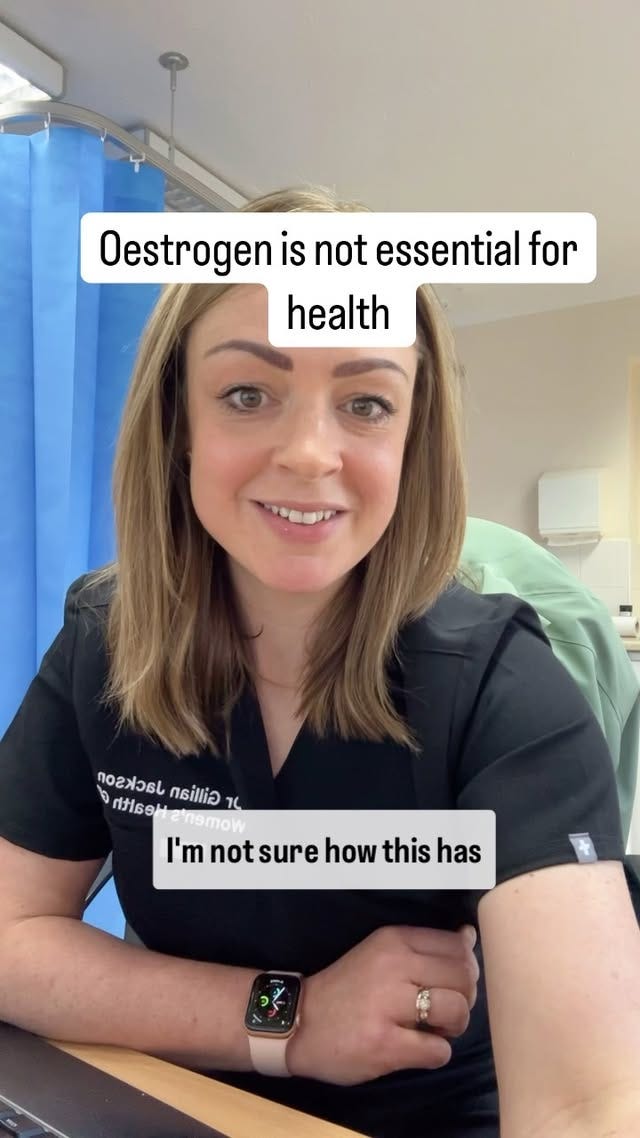Antidepressants or Estrogen? The Silent Psychological Toll of Perimenopause
Is It Perimenopause or Just Life Being Life? It's not the same answer for everyone.
There’s this weird moment a lot of us go through, but we don’t always connect the dots. We start to feel like we’re falling apart in ways we can’t explain.
The anxiety shows up out of nowhere.
We burst into tears at the worst possible times.
And we start wondering if we’ve suddenly developed ADHD because walking into a room and forgetting why we’re there has become a daily thing.
So we head to the doctor, completely exhausted and overwhelmed. And we walk out with a script for antidepressants.
Now, don’t get me wrong. Antidepressants have an important place when it comes to mental health. But what many women don’t realise is that what they’re experiencing isn’t just stress. It’s hormonal chaos. It’s perimenopause.
The Zone of Chaos: What’s Going On In Our Brains During Perimenopause?
For years, menopause has been painted as the ending of all things. Periods, libido, sleep, energy, even our sense of identity.
But the spotlight rarely lands on the years leading up to it. That seven-to-ten-year stretch where everything feels off—that’s perimenopause.
Dr Mary Claire Haver calls it the Zone of Chaos, which honestly feels pretty accurate.
Hormones that used to flow in a steady rhythm now rise and crash without warning. Estrogen and progesterone are all over the place, which can disrupt the brain chemicals that help regulate mood, focus, and emotions.
What does this actually feel like?
Anxiety, even if you’ve never had it before
Irritability, snapping at the people you love over things that don’t matter
Brain fog, losing your train of thought mid-sentence
Low motivation, struggling to feel joy
Sleep disturbances, waking up for no reason at 3am
Feeling scattered and disorganised, like you can’t hold a thought in your head
If you’ve nodded at a few of those, you’re not imagining it. And you’re definitely not alone.
Antidepressant use doubles in perimenopause, and yet many of us don’t realise our hormones might be behind it.
So Why Are Women Being Prescribed Antidepressants Instead of Estrogen?
For decades, hormone therapy was basically put in the naughty corner. A flawed study in the early 2000s made HRT sound riskier than it actually was. As a result, doctors backed away from prescribing it.
This study, published in 2002 by the Women’s Health Initiative (WHI) created a media firestorm, linking HRT to an increased risk of breast cancer, heart disease, and stroke.
The study was seriously misrepresented. It mainly involved women who were much older — the average age was 63 — and many already had other health risks. Plus, they used a type of synthetic hormone therapy that is different to the body-identical options many women use today. Later analysis showed that when HRT is started closer to the onset of menopause, the benefits often outweigh the risks. But by then, the damage was done. Fear replaced facts, and a whole generation of women missed out on potentially life-changing treatment.
Now, we have a whole generation of health professionals who either won’t prescribe HRT or MHT or don’t feel confident doing so. Instead, women are given antidepressants, often without any real conversation about hormones.
Here’s what’s wild though: research shows estrogen can be more effective than antidepressants for depression that’s linked to perimenopause.
Some studies suggest that starting HRT/MHT during perimenopause can even help prevent new-onset depression. And that tracks when you realise how many estrogen receptors live in our brains. When estrogen becomes erratic or drops off, the brain struggles to keep things like mood, memory and emotional balance in check.
And yet many women are never even told that HRT/MHT might be an option.
Is It Perimenopause or Just Life Being Life?
This is where it gets tricky. Perimenopause symptoms can look a lot like regular life stress, anxiety, burnout or even a midlife crisis. So we blame ourselves. We think we’re just not coping.
If you’re unsure, it might help to reflect on a few things:
Have your periods changed; shorter, longer, heavier, more erratic? (Although this isn’t always the first sign!)
Are you having hot flushes or waking up drenched in sweat? (Again, it may or may not happen to everyone.)
Are you experiencing new symptoms, such as joint pain, palpitations, anxiety or migraines?
Do you feel like your brain and mood are out of sync with the rest of your life?
You can also check out the Australian Menopause Society Scorecard here. It’s a helpful tool, especially if you’re trying to figure out whether your symptoms might be hormone-related.
What Can You Actually Do About It?
Find a menopause-literate doctor. Not all GPs are across this. If you feel dismissed or rushed out with a prescription that doesn’t feel right, get a second opinion. Use the Australian Menopause Society Scorecard to help demonstrate the actual symptoms you are experiencing.
Look into HRT/MHT. If it’s safe for you, it can help with more than just moods. It supports bone, brain and heart health too and can be tailored to your own needs.
Support your brain naturally. Estrogen helps our happy brain chemicals work better, so when it's low, lifestyle matters even more:
Eat plenty of protein
Move your body regularly, especially through strength training
Prioritise good sleep (and ease up on the wine—it messes with sleep)
Try mindfulness, therapy, or whatever helps manage stress
Learn from the right people. There’s no one-size-fits-all approach, but experts like Dr Mary Claire Haver and Dr Louise Newson are doing brilliant work in this space.
Let’s Reframe This Whole Thing
Too many of us have been sent home with antidepressants and told to just get on with it. But you’re not broken. You’re not lazy. You’re not losing the plot.
Perimenopause isn’t a mental breakdown. It’s a transition. A biological shift that more people need to understand, talk about and prepare for.
And the more we speak up, the better the chances that the next generation won’t be left in the dark like we were.
Sometimes antidepressants are needed. Sometimes it’s HRT/MHT. Sometimes it’s both. But we deserve more than a guess and a script. We deserve to be informed and supported.
Disclaimer:
Now, don’t get me wrong. I’m not a HRT/MHT or estrogen pusher, and I am not an expert. I’m simply sharing what I’ve learnt and what has helped me.
My belief is that not every woman needs it or suffers in the same way. Personally, I know it’s not the only solution.
For me, it has been a tool that helped me get my other lifestyle factors in order, to really push through the struggle.
Will all women experience the same level of suffering, or even suffer at all? From what I’ve learnt, no. But for the women who are struggling, I want them to know they can feel better.
It’s not a one-size-fits-all approach, but it certainly makes sense to find a good healthcare practitioner who can work with you, involve you in joint decision-making, and help you know all the options available.









Great post.
Thanks to the flawed WHI study both my wife and her best friend were taken off estrogen years ago. My wife suffered with hot flashes but her best friend suffered with hot flashes AND depression AND anxiety. Neither got estrogen again when they needed it most. My wife toughed through the hot flashes. Her friend was prescribed anti-depressants and tried various ones until she hit on one that MASKED the true problem: low estrogen. Why weren’t they prescribed estrogen even later when the WHI study was “debunked”? It’s because doctors didn’t keep up and believed that estrogen use was dangerous. Here in the USA the FDA still requires that vaginal estrogen carry a “black box” warning that makes no sense. This results in less than 10% of women who could benefit from using Estradiol cream NOT using the product. So instead they suffer with UTI’s, painful sex, or give up on sex entirely. Tragic.
Keep writing Robyn. The world needs you!
This is so helpful! Thank you.